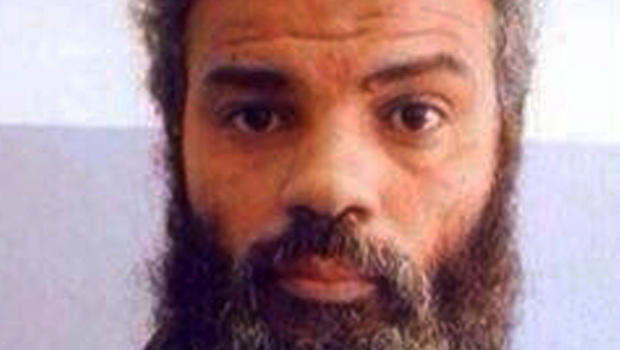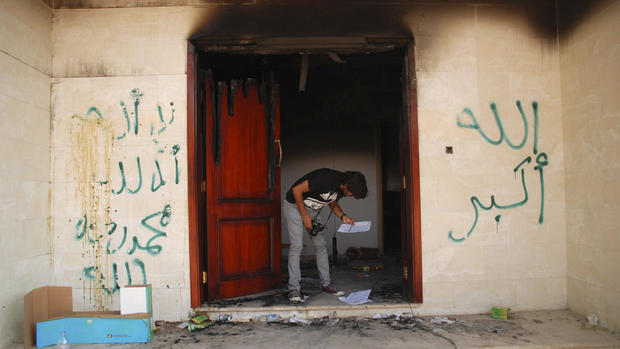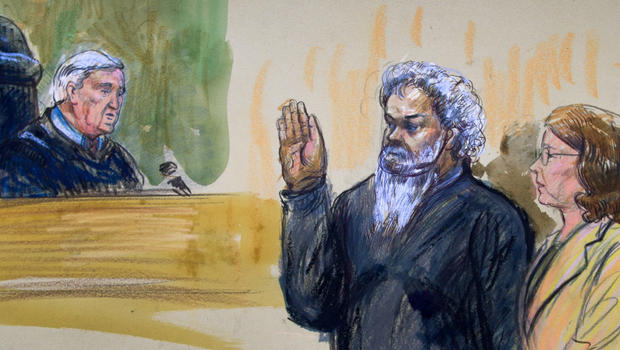DOJ brings possible death penalty charges against Benghazi suspect
WASHINGTON - A Libyan militant already behind bars was indicted Tuesday on new charges arising from the 2012 Benghazi attacks, including crimes punishable by the death penalty, the Justice Department said.
The new 18-count grand jury indictment, which includes multiple counts of murder, had been widely expected since Ahmed Abu Khattala was captured in June by U.S. special forces and brought to the United States to face trial.
Abu Khattala, 43, the first militant to be prosecuted for the Benghazi violence, had initially been charged with conspiracy to provide support to terrorists, resulting in death. U.S. officials had described that initial, one-count indictment as a placeholder to allow for him to be brought into court and for a grand jury to hear more evidence.
The new indictment does not add to the public account of how the attacks unfolded but it does include multiple counts that make Abu Khattala eligible for the death penalty if convicted, including murder of an internationally protected person and killing a person during an armed attack on a federal facility. It also accuses him, among other charges, of providing material support to terrorists, malicious destruction of property and attempted murder of an officer and employee of the U.S.
After his capture during a nighttime raid, Abu Khattala was brought to the U.S. aboard a Navy boat where he was interrogated by federal agents. He remains in custody at a detention facility in Alexandria, Virginia. Abu Khattala, who earlier pleaded not guilty to the terrorism conspiracy charge, is scheduled to be arraigned next week in U.S. District Court in Washington on the new charges.
One of his public defenders, Michelle Peterson, said last summer that prosecutors had not presented evidence tying him to the attacks.
"It is important to remember that an indictment is merely a set of allegations or charges, it is not evidence," she said Tuesday evening. "We will vigorously defend Mr. Abu Khatalla in court where the government will be forced to prove his guilt, based upon actual evidence."
Federal prosecutors have long accused Abu Khattala of being a ringleader of the Sept. 11, 2012, attacks that killed Ambassador Chris Stevens and three other Americans. Attorney General Eric Holder said the new indictment reflects Abu Khattala's "integral role" in the attacks.
The superseding indictment alleges that Abu Khattala was involved in two different attacks, hours apart, on the diplomatic compound. The violence, which quickly emerged as a flashpoint in American political discourse, was aimed at killing American personnel at the compound and looting the buildings of documents, maps and computers, the Justice Department says.
In the first burst of violence on the night of Sept. 11, prosecutors allege, Abu Khattala drove to the diplomatic mission with other militants and a group of about 20 breached the main gate and later launched an attack with assault rifles, grenades and other weapons. That initial attack killed Stevens and communications specialist Sean Smith and set the mission ablaze.
Prosecutors say Khattala supervised the plunder of sensitive information from that building, then returned to a camp in Benghazi where a large group began assembling for an attack on a second building known as the annex. The attack on that facility, including a precision mortar barrage, resulted in the deaths of security officers Tyrone Snowden Woods and Glen Anthony Doherty, authorities say.


